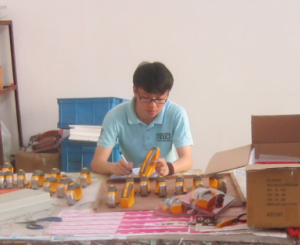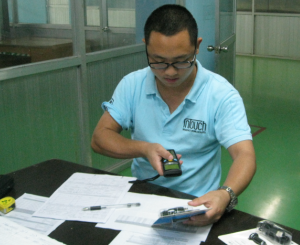Ceramic tiles, glazed ceramic wall tiles, ceramic mosaic tiles, quarry tiles, or paver tiles have several quality control tests that are used to meet product specifications. Ceramic tile inspection tests established by ASTM (the American Society of Testing and Materials) include ceramic tile strength, abrasion resistance to ceramic tile, chemical resistance to ceramic tile, water absorption, dimensional stability, frost resistance, linear coefficient of thermal expansion, and slip resistance tests.
Key points for QC inspection of ceramic tiles:
Resistance of Ceramic Tile to Chemical Substances
Resistance of Ceramic Tile to Chemical Substances Test is used for testing ceramic tiles that are to be used as food preparation counters, bathrooms, flooring in residential and commercial buildings, where tiles may become exposed to food, and chemicals. A solution of hydrochloric acid and potassium hydroxide are the common testing liquids used for testing. Color difference tests are used to determine which tile surfaces are affected by acids and alkalies.

Breaking Strength of Ceramic Tile
Breaking Strength of Ceramic Tile Test establishes whether or not a ceramic tile, glazed ceramic wall tile, ceramic mosaic tile, quarry tile, or paver tile meets the strength requirements as noted in the ceramic tile specifications. The tile strength is measured by the force in pounds to cause the tile to break. The breaking strength of ceramic tile test is measured by using a pressure gauge that reads force in pounds.
Relative Resistance to Deep Abrasive Wear of an Unglazed Ceramic Tile
Relative Resistance to Deep Abrasive Wear of an Unglazed Ceramic Tile measures the resistance to deep abrasive wear of a unglazed ceramic tile specifically used for floor installations. A rotating disk is used to preform the test by creating deep abrasive wear into the tile. This method is used to measure the durability of an unglazed tile.

Quality Control Tests have to also be preformed in the manufacturing stage. This type of quality control consists of charts that are used to record particle size, milling time, drying temperature, time, compaction pressure, dimensions after pressing, density, firing temperature and time. If importing ceramic tiles from China then performing testing and inspection prior to shipment is critical. Always make sure you when have the proper ASTM ceramic tiles tests performed by InTouch Quality's experienced staff who will create a ceramic tile inspection procedure personalized for you.







